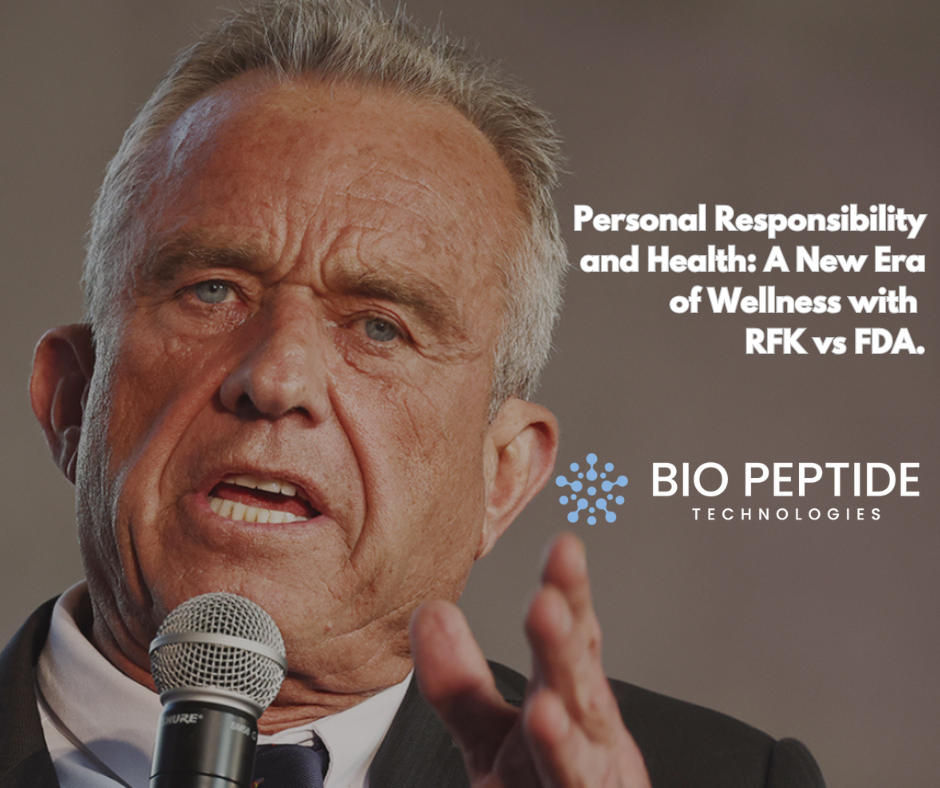
Personal Responsibility and Health: A New Era of Wellness with RFK vs FDA.
Is anyone else relieved the election season is behind us?
While politics can be overwhelming (and frankly, a bit of a circus), its impact on our daily lives can’t be ignored. The decisions made in Washington ripple through our healthcare system, economy, and even how we approach our personal well-being.
One figure who caught my attention this election cycle was Robert F. Kennedy Jr. For decades, RFK has been a vocal advocate for health and wellness, but not in the typical “eat a salad and jog on weekends” kind of way. This guy embodies a full-spectrum approach to health:
• He trains hard with a rigorous weightlifting routine
• He prioritizes nutrition, including fasting and high-protein meals
• He’s hormonally optimized for peak performance
• And let’s be real—he probably uses a peptide or two
At 70, RFK isn’t just healthy by conventional standards; he’s thriving in a way that turns heads. (Seriously, search for his workout photos—you’ll be as inspired as I was!)
But RFK’s lifestyle isn’t the only thing worth discussing. He recently sparked a significant conversation about health freedom and the future of wellness in America.
The Tweet That Turned Heads

A few weeks ago, RFK posted a tweet that made waves, touching on topics like peptides, stem cells, and psychedelics as tools for optimizing health. Seeing this level of transparency from a prominent political figure was refreshing—and, honestly, a little mind-blowing.
Historically, public health discussions from policymakers have been limited to reactive measures like disease prevention and pharmaceutical interventions. But RFK’s focus on innovation and personal empowerment could represent a seismic cultural shift.
A Paradigm Shift: From Outsourcing to Ownership
For years, Americans have been conditioned to outsource their health to external authorities. We’ve been taught to place blind faith in medical professionals and regulatory agencies, even when our instincts tell us otherwise.
This reliance has created what I call the “lab coat authority complex”:
• Feeling powerless to question your doctor, even when treatments don’t work.
• Trusting “health authorities” during crises, even when their guidance proves inconsistent.
• Deferring to the FDA as the ultimate gatekeeper of safety and efficacy, even when financial interests cloud its decisions.
The result? A society that’s overly dependent on a flawed, reactionary healthcare system.
RFK’s message challenges this paradigm, advocating for personal responsibility in health decisions. Instead of waiting for institutions to grant permission, he’s urging individuals to educate themselves and take proactive steps toward better health.
Why Aren’t Peptides FDA-Approved?
One of the most common concerns about peptides is their lack of FDA approval. Many people hesitate to explore options like Semaglutide or BPC-157 simply because they’re not officially sanctioned.
Here’s the reality: FDA approval doesn’t always mean what you think it does.
Peptides are naturally occurring molecules, which means pharmaceutical companies can’t patent them. Without the promise of exclusivity (and profits), there’s little incentive to fund the costly FDA approval process.
This isn’t just true for peptides. The same roadblocks exist for other cutting-edge treatments like stem cells and psychedelic therapy—treatments with incredible potential but limited profit margins for Big Pharma.
Case in point: pharmaceutical giant Eli Lilly recently pushed the FDA to block generic formulations of Semaglutide to protect their bottom line.

What This Could Mean for the Future of Health
RFK’s health advocacy—combined with his visibility—could spark a much-needed wake-up call:
• It challenges the status quo, exposing the limitations and biases of our current healthcare system.
• It fosters skepticism, encouraging people to critically evaluate the guidance of health agencies.
• It empowers individuals, reminding them that true wellness requires taking ownership of their decisions.
Ultimately, the message is clear: You are the CEO of your health.
Why Personal Responsibility Matters
If you want to reclaim your health, you must be willing to take charge. This means:
• Researching your options, from peptides to lifestyle changes
• Seeking out holistic solutions, not just reactive treatments
• Trusting your instincts and understanding your body’s unique needs
Regulatory agencies and medical professionals have their place, but they should complement—not control—your wellness journey.
Your Health, Your Choice
We’re at a crossroads in how we approach health in America. Will we continue to rely on a one-size-fits-all system that prioritizes profits over progress? Or will we embrace a more proactive, individualized approach to wellness?
The choice is yours. But remember: no one cares about your health as much as you do.
You’re sovereign. You’re empowered. And you’re calling the shots.

Leave a comment